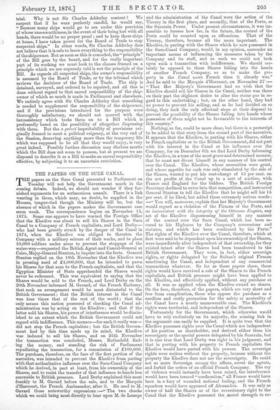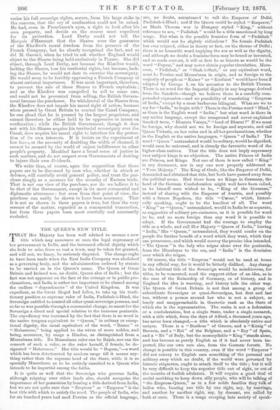THE PAPERS ON THE SUEZ CANAL.
THE papers on the Suez Canal presented to Parliament on Tuesday will not help the Government much in the coming debate. Indeed, we should not wonder if they fur- nished arguments for an acrimonious assault. There is a link wanting in them, which may, no doubt, be supplied in the Houses, tongue-tied though the Ministry will be, but the absence of which in the papers makes the Government case seem weak. The correspondence begins on November 15, 1875. Some one appears to have warned the Foreign Office that the Khedive was about to sell his Shares in the Suez Canal to a Company of French capitalists, and Lord Derby— who had been greatly struck by the danger of the Canal in 1874, when the Khedive was obliged to threaten the Company with a military seizure of their works, and to place 10,000 soldiers under arms to prevent the stoppage of the water-way—requested the British Agent and Consul-General at Cairo, Major-General Stanton, to inquire into the facts. General Stanton replied on the 18th November that the Khedive was in pressing need of £4,000,000, that he intended to pawn his Shares for that sum to the French capitalists, and that the Egyptian Minister of State apprehended the Shares would never be redeemed. This was equivalent to saying that the Shares would be sold to the French, and Lord Derby on the 20th November informed M. Gavard, of the French Embassy, that such an arrangement would be most distasteful to the British Government ; that the British interest in the Canal was four times that of the rest of the world ; that the only means this nation possessed of checking the Canal ad- ministration was by acting on the Khedive ; and that if the latter sold his Shares, his power of interference would be dimin- ished to an extent which the British Government could not regard with indifference. This menace—for such it really was— did not stop the French capitalists ; but the British Govern- ment had by this time made up its mind, the Khedive was induced to sell his Shares, and on 25th November the transaction was concluded, Messrs. Rothschild find- ing the money, and standing the risk of Parliament repudiating the transaction, for a commission of £100,000. The purchase, therefore, on the face of the first portion of the narrative, was intended to prevent the Khedive from parting with that authoritative influence over the Suez-Canal Company which he derived, in part at least, from his ownership of the Shares, and to resist the transfer of that influence to hands less amenable to British pressure. Lord Derby explained this most frankly to M. Gavard before the sale, and to the Marquis d'Harcourt, the French Ambassador, after it. He used to M. Gavard these noteworthy expressions :—" The two checks which we could bring most directly to bear upon M. de Lesseps
and the administration of the Canal were the action of the Viceroy in the first place, and secondly, that of the Porte, as the Suzerain Power. Under present circumstances, it was im- possible to foresee how far, in the future, the control of the Porte could be counted upon as efficacious. That of the
Viceroy, therefore, became all the more important. The Khedive, in parting with the Shares which he now possessed in the Suez-Canal Company, would, in my opinion, surrender an important means of influencing the measures taken by the Company and its staff, and as such we could not look upon such a transaction with indifference. We should cer- tainly be opposed to these Shares falling into the hands of another French Company, so as to make the pro- perty in the Canal more French than it already was.* And he said to the Marquis d'Harcourt, on November 27 :- "That Her Majesty's Government had no wish that the Khedive should sell his Shares in the Canal, neither was there on their part the slightest desire to alter the status quo in re- gard to this undertaking ; but, on the other hand, they had no power to prevent his selling, and as he had decided on so doing, they took the only effectual steps at their disposal to prevent the possibility of the Shares falling into hands whose possession of them might not be favourable to the interests of this country."
Nothing, so far, could be more clear, but there is a postscript to be added to that story from the second part of the narrative. It appears that the Khedive, in parting with his Shares, either to French capitalists or to the British Government, did not part with his interest in the Canal or his influence over the Company, for on December 6th we find Lord Derby informing the Khedive, in a tone of the most grave and determined menace,. that he must not divest himself in any manner of his control over the Canal. The Khedive, whose necessities were great, and whose appetite for cash was only stimulated by the sale of. the Shares, wanted to put his rent-charge of 15 per cent. on the net profits of, the Canal up to a sort of auction, with France and England for the bidders. The British Foreign Secretary declined to enter into that competition, and instructed General Stanton to tell the Khedive that he might sell his 15 per cent, if he liked, but added these extremely serious words : —" You will, moreover, explain that her Majesty's Government would regard as a violation of the Firman of the Porte, and as inconsistent with the integrity of the Ottoman Empire, any act of the Khedive dispossessing himself in any manner of the control over the Suez Canal, which has been se- cured to his Highness by the Company's concessions and statutes, and which has been confirmed by the Porte." The rights of the Khedive over the Canal, therefore, which at first were said to be dependent upon his ownership of the Shares, were immediately after independent of that ownership, for they existed intact after the Shares had been transferred to the British Government. They were, in fact, either sovereign rights, or rights delegated by the Sultan's original Firman sanctioning the Canal, and independent of any commercial
transactions whatever. So far as these papers show, these rights would have survived a sale of the Shares to the French
capitalists, and British pressure might have been applied to the Khedive, and effectively applied, without any purchase at all. It was so applied when the Khedive owned no shares. On the face, therefore, of the papers, which are very short and free from complication, those who oppose the purchase as a needless and costly precaution for the safety or neutrality of the Canal have a nearly unanswerable case. The Khedive's rights were territorial, and independent of the Shares.
Fortunately for the Government, which otherwise would have to rely exclusively on its majority, the missing link in
the argument can easily be supplied. It is quite true that the
Khedive possesses rights over the Canal which are independent of his position as shareholder, and derived either from his sovereignty or the special powers delegated by his Suzerain, but it is also true that Lord Derby was right in his judgment, and that in parting with his property to French capitalists the Khedive would have parted with his powers. The sovereign
rights were useless without the property, because without the property the Khedive dare not use the sovereignty. He could
not as mere Sovereign occupy the offices, arrest the agents, and forbid the orders of an official French Company. The cry of violence would instantly have been raised, the interference
would have been termed " confiscation," all France would have
been in a fury of wounded national feeling, and the French squadron would have appeared off Alexandria. It was only as owner of half the Shares or of the reversionary right to the Canal that the Khedive possessed the moral strength to ex- ercise his full sovereign rights, secure, from his large stake in the concern, that the cry of confiscation could not be raised. He had, even in Frenchmen's eyes, a right to look after his own property, and decide on the course most expedient for its protection. Lord Derby could not tell the Marquis d'Harcourt that the Shares were the guarantee of the Khedive's moral freedom from the pressure of the French Company, but he clearly recognised the fact, and so did M. Gavard, when he tried to ask whether England would object to the Shares being held exclusively in France. She did object, through Lord Derby, not because the Khedive would, lacking the Shares, lose his territorial rights, but because, lack- ing the Shares, he would not dare to exercise the sovereignty. He would seem to be forcibly oppressing a French Company of almost national importance. It was most important, therefore, to prevent the sale of these Shares to French capitalists ; and as the Khedive was compelled to sell to some one, and could not be prevented from selling, the British Govern- ment became the purchaser. Its withdrawal of the Shares from the Khedive does not impair his moral right of action, because when pressed by Great Britain to control the Canal Company, he can plead that he is pressed by the largest proprietor, and cannot therefore be either held to be oppressive or intent on confiscation ; while the British Government, though it does not with his Shares acquire his territorial sovereignty over the Canal, does acquire his moral right to interfere for the protec- tion of its own interests. If it insists on the experiment of low fares, or the necessity of doubling the width of channel, it cannot be accused by the world of unjust indifference to other people's property. Mankind have a broad sense of justice in such matters, and do not suspect even Governments of desiring to injure their own dividends.
We write thus, of course, upon the supposition that these papers are to be discussed by men who, whether in attack or defence, will carefully avoid general policy, and treat the pur- chase simply as a measure for the security of Eastern trade. That is not our view of the purchase, nor do we believe it to be that of the Government, except in its most ceremonial and diplomatic utterances ; but even from that point of view, the purchase can easily be shown to have been necessary. That it-is not so shown in these papers is true, but then the very essence of the matter, regarded as a commercial transaction, has from these papers been most carefully and necessarily excluded.



































 Previous page
Previous page